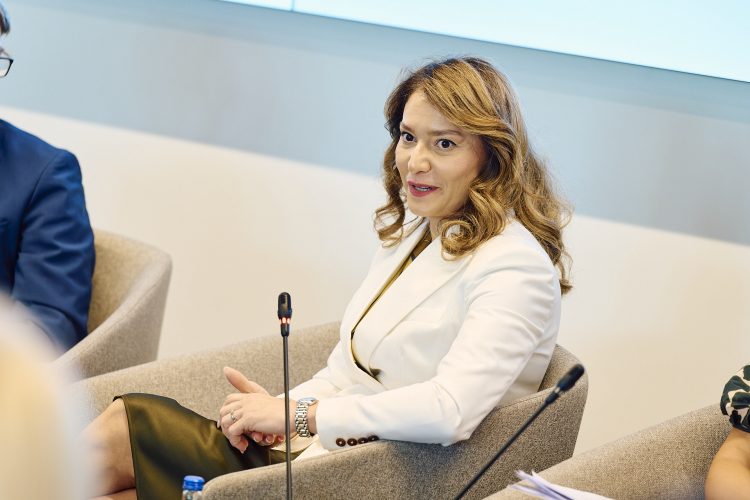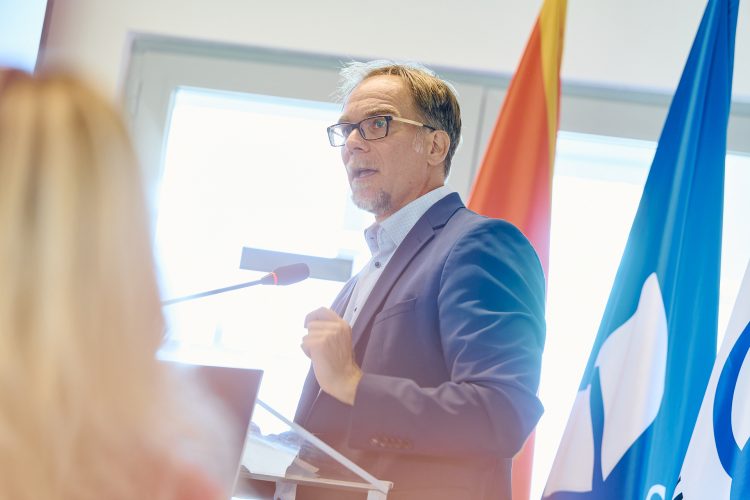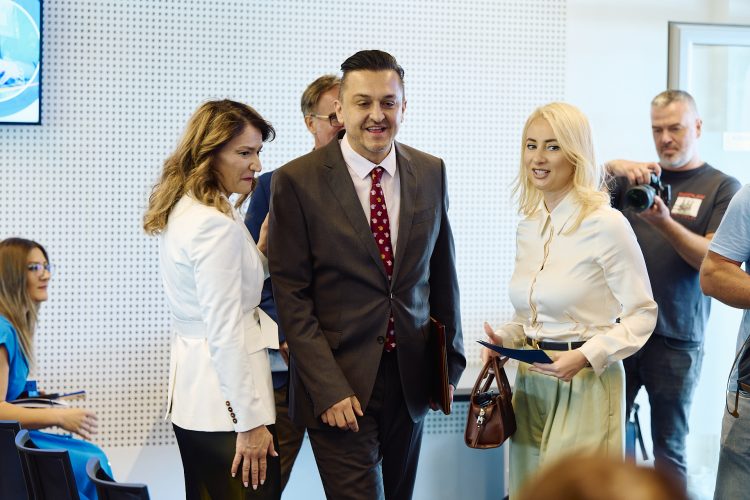Montenegro, before closing Chapter 5, has not only fulfilled the formal requirements of the European Commission (EC) but has changed the concept of public procurement, said the head of the working group for this chapter, Jelena Jovetić, adding that it is important for the state to have a system that is trusted.
The Director of the Public Procurement Directorate in the Government of Slovenia, Sašo Matas, considers that the chapter on public procurement is one of the most important in the EU negotiations and that its closure will affect negotiations in other chapters.
Jovetić said in a podcast by the MINA agency that closing Chapter 5 did not only involve the negotiation flow and harmonization with regulations, but that Montenegrin institutions were being built in that process.
She said that in the Ministry of Finance, public procurement as a mechanism was seen as a fiscal category, that is, the spending of public money – citizens’ money.
“We always had an additional obligation, which is to act prudently with that money, and we transmitted that to other public bodies participating in the public procurement system,” Jovetić explained.
On the other hand, she added, public procurement is an economic category, and there is an obligation that the money spent through public procurement, which amounts to 700 to 800 million EUR annually, is spent transparently and that competition is ensured.
Jovetić stated that all of this was required by the EC, and there were also three final benchmarks relating to legislation, the electronic public procurement system, and the creation of human and institutional capacities for monitoring public procurement.
She stated that the formal expectations of European partners were met, but at the same time, they did much more.

“I think that by closing Chapter 5, which is one of the most complex in the negotiation process and part of Cluster 1, that is, the rule of law, the EC sent a message that not only have we fulfilled the formal requirements, which was our obligation, but we undertook additional activities and actually changed the concept of public procurement throughout the entire process,” Jovetić said.
Matas congratulated the closure of Chapter 5 and added that it is one of the most difficult in negotiations. He also explained that public procurement in the EU is part of the internal market and that 15 percent of gross domestic product (GDP) is used in public procurement.
“That means that every sixth EUR we spend in the EU is spent through the public procurement system. So this chapter is certainly one of the most important and significant. Chapter 5 is important both for the country itself and for the EU,” Matas said.
Asked how the closure of this chapter will affect further negotiations with the EU, he replied that it is very important that it is one of the first chapters to be closed.
“And since it is one of the most difficult chapters, the fact that Montenegro concluded this process so quickly, I think, will also affect other chapters,” Matas noted.

Jovetić, answering the same question, said that closing Chapter 5 represents a new momentum, and that the important message is that the EC supported Montenegro in a very complex chapter, which has implications for the fiscal system and economic environment and is part of the internal market.
She added that the most significant message is that Chapter 5 is part of Cluster 1 and the rule of law, and it is the first chapter closed from that cluster, which symbolizes that the state is determined to fight and has an anti-corruption policy to combat irregularities and abuses in the system.
Speaking about the benefits that citizens and the economy will have from closing Chapter 5, Jovetić reminded that a new regulatory framework was adopted and that the important message is that the state has a system that is trusted, which is most important when building a new public procurement system.
She stated that with the support of the EC, they managed to create an electronic public procurement system, so now bids and complaints are submitted electronically and the entire system is covered by the new operational system, which has contributed to increased competition.
Jovetić believes it is important to motivate economic entities to participate in the public procurement system and that Montenegro has received confirmation that public procurement meets European standards.
“Then our citizens will be able to receive all those public services efficiently and at a level that European citizens expect,” Jovetić said.

According to her, this also means that these standards can be respected both at the level of tender processes and in the part of fulfilling contractual obligations, that is, public procurement contracts.
“We have expanded the system by law, so public procurement is not only a form to have a tender announcement and contract conclusion, but we have expanded it from the announcement of the tender to contract implementation, which means that the segment of control we conduct is extended,” Jovetić explained.
She added that she believes Montenegrin citizens will receive from public authorities what they expect, on time and efficiently.
“And the key message is that the funds that the state manages, that is, citizens’ public funds, will be spent transparently and everyone will know the path of expenditure of those funds,” Jovetić stated.
Matas, speaking about the benefits, emphasized that there are many advantages from European integration in public procurement.
“First, it is a quality, modern, and efficient public procurement system, which actually reduces corruption, increases value for money, and surely there are other social benefits,” Matas said.

He believes that closing Chapter 5 and European integration bring greater stability in this area.
Matas explained that the contracting authority needs a stable and quality system that provides what it wants to buy on the market, with as much competition and market contest as possible, and reduces corruption. According to him, transparency through digitalization is one of the most important things.
“I think Montenegro has already done a lot in digitalization. That was also part of these negotiations for sure; it is not only the transposition of legislation into the domestic legal system,” Matas said.
He added that digitalization is one of the three or four most important pillars of public procurement.
“Through digitalization, not only is transparency increased, but more value is obtained for the money and costs are reduced,” Matas said, noting that, in the age of artificial intelligence, digitalization is the most vital thing after stable legislation, which Montenegro has already done.
Asked about the most important changes established in the public procurement system in Montenegro, Jovetić said that the law regulating this area has been changed, a completely new framework and subordinate regulations adopted, as well as a new regulatory framework in the area of public-private partnerships and concessions.
Jovetić said that in this process, an electronic public procurement system was also created, adding that the most important thing was to relieve businesses of certain administrative tasks and encourage them to be part of the public procurement system.
She emphasized that it is particularly important that the state is expected to have institutions within the public procurement system that can handle challenges.
“It is expected that we are ready to implement these standards we have accepted, the new systems we are working on, and we in the Ministry of Finance remain firmly committed to applying the standards,” Jovetić stated.
She said that it was crucial in the process to have the experience of colleagues from Croatia and Slovenia available.
Asked what will be done to ensure Montenegro remains at the level of European standards, Jovetić replied that it is important that European directives are not changed too often, stating that this provides stability.
According to her, the most important thing for Montenegro is to ensure an anti-corruption policy, and that is what is expected from the state.
“We will have to, over the next year, in partnership with other institutions, strengthen the action mechanisms, especially those implemented in the Ministry of Finance, and we are working on that diligently,” Jovetić said.
She stated that another important thing is implementation, which means that if certain standards are accepted, their application must be ensured.

Jovetić said that it is important that the actions not performed by the system itself in electronic systems are carried out by qualified persons in whom investment is made.
Matas, asked how important it is that after closing Chapter 5 Montenegro continues to develop and improve the public procurement system, replied that much has been done, but this is only the beginning.
“Continuous investment is needed in citizens’ trust, in the professionalization of those public officials and others working in public procurement, in the system itself, and in institutions,” Matas said.
According to him, it is possible to have the best law, but if institutions do not function as they should, the system is weak.
Matas noted that the EC has now begun consultations and is preparing new directives, so in the next few years all EU countries, and Montenegro, will likely need to change legislation.
He also warned that the closure of Chapter 5 is only the beginning of a long journey.
SOURCE: MINA AGENCY


